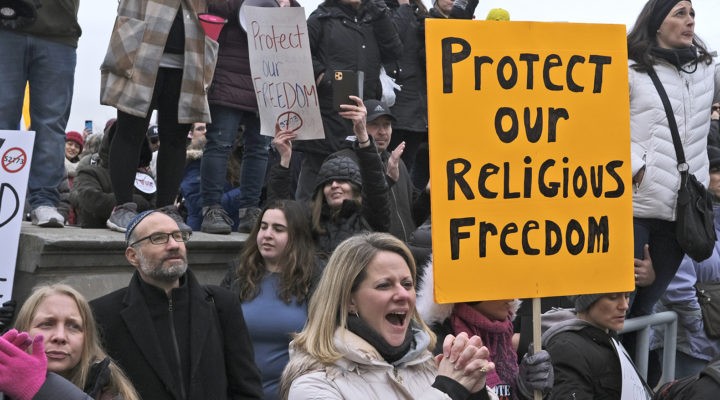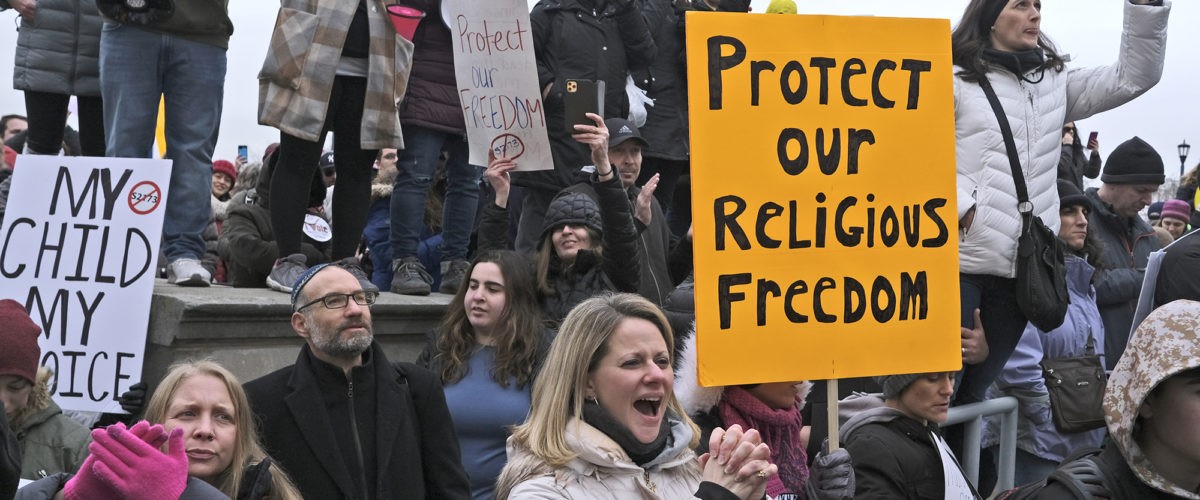The most-read article on Baptist News Global’s website for the month of August was about religious exemptions to employer and school mandates on COVID-19 vaccines. That article was accessed nearly 50,000 times in two weeks and continues to be read thousands of times daily.
This mirrors national interest as vaccine deniers seek ways to justify their decisions and employers and school administrators seek ways to understand what’s legal.
Although most labor laws are federal in scope, most vaccine requirements — or bans on requirements — come from the state level. This creates an uneven patchwork of regulations based largely on which political party controls the state legislature and the governor’s office.
20 states, all with Republican governors, prohibit proof-of-vaccination requirements by any business or school.
The website Ballotpedia is tracking this. It reports that 20 states, all with Republican governors, prohibit proof-of-vaccination requirements by any business or school. In 11 of those states, governors banned proof-of-vaccination requirements through executive orders. In nine of those states, legislators passed laws banning proof-of-vaccination requirements.
Only four states — California, New York, Hawaii and Oregon — have created digital vaccination status applications or exempt fully vaccinated individuals from some COVID-19 restrictions if they can provide proof of vaccination, Ballotpedia reports. All four of those states have Democratic governors.
Illustrative of this divide, while most major U.S. airlines are requiring employees to be vaccinated, three airlines are not. All three are based in Republican-controlled states — Southwest Airlines (Texas), American Airlines (Texas) and Delta Airlines (Georgia).
Although Texas Gov. Greg Abbott has issued an executive order banning vaccine mandates, a Houston hospital group has required all employees to be vaccinated and initially won its case with a federal district judge. A few hundred unhappy employees who refused to be vaccinated are appealing the case and have vowed to take it all the way to the U.S Supreme Court if necessary.
A similar legal dispute is under way in Maine, where 2,000 anonymous health care workers have challenged an order by the governor that all health care workers must be vaccinated. However, this claim may face scrutiny as well, since the workers are tying their objections to a purported connection between the vaccines and “the cell lines of aborted fetuses.” While the Johnson and Johnson vaccine has a distant relationship to a historic line of cells obtained from a fetus, the Catholic Church has said this relationship is so distant as to not be a problem. The Moderna and Pfizer vaccines have no relationship to aborted fetal cells.
Meanwhile, three other recent court rulings on the issue have produced mixed results.
In Michigan, a federal court ordered Western Michigan University to grant religious exemptions to four members of the women’s soccer team. The school has a vaccine mandate for all student athletes. The four students had applied for a religious exemption but were denied that exemption by the school. A complicating factor is that the university does not require all students to be vaccinated, just student athletes.
The student claimed her Roman Catholic faith as the basis for her exemption, but the pope and other Catholic officials have encouraged Catholics worldwide to get vaccinated.
In Louisiana, a federal court said Edward Via College of Osteopathic Medicine must offer a religious exemption to students who seek to avoid the school’s vaccine mandate on such grounds. The court based its ruling, in part, on a determination that the school’s policies violate state religious freedom laws.
In Massachusetts, a federal court upheld the University of Massachusetts’ denial of a student request for a religious exemption to the school’s vaccine mandate. The student claimed her Roman Catholic faith as the basis for her exemption, but the pope and other Catholic officials have encouraged Catholics worldwide to get vaccinated. Moreover, the court ruled, the university is under no constitutional obligation to offer a religious exemption to its vaccine requirement.
Public health officials warn that granting exemptions to vaccine mandates — except in cases of valid medical concerns — will weaken the nation’s ability to achieve herd immunity and thereby protect all people.

Robert Klitzman
In an op-ed for the Los Angeles Times, Robert Klitzman, professor of psychiatry and director of the bioethics master’s program at Columbia University, said exemptions “could endanger others, including family members, co-workers and patients, if the employee works at a hospital. The Occupational Safety and Health Act requires a safe and healthy workplace for everyone, and the Centers for Disease Control and Prevention and EEOC have stated that COVID-19 is a ‘direct threat’ in the workplace.”
Such employees “should not be able to simply check off a box to ask for an exemption, but have to show evidence of their beliefs and be interviewed to prevent them from cutting and pasting text from online templates, he wrote.
The bottom line, Klitzman said, is this: “Individuals have a right to their religious beliefs, but not a right to harm others. As Supreme Court Justice Oliver Wendell Holmes Jr. famously wrote, even free speech has limits, stopping at the point of falsely yelling ‘fire’ in a crowded theater.”
For churches or businesses that want to explore the issue of religious exemptions and vaccines, Interfaith Youth Core has published a list of online resources.
Related articles:
Church ‘religious exemption’ letters against COVID vaccination mandates likely won’t work
Get ready for more claims of ‘religious exemptions’ to vaccine mandates
A pediatrician’s advice to parents worried about the COVID vaccine and their children
Francis Collins: ‘Give God the glory’ for vaccines ‘but roll up your sleeve’
6 things you should know about the COVID vaccine | Opinion by Christy Edwards and Jen Dilts


